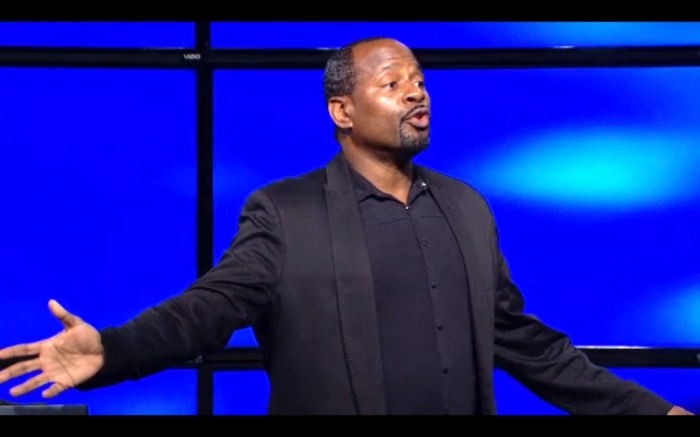Pastor Tony Clark Says God Sends 'Storms of Correction' in Believers' Lives as He Preaches at Harvest Church

Pastor Tony Clark from Virginia delivered a sermon at California's Harvest megachurch on Sunday, sharing two reasons why Jesus allows storms in believers' lives. How Christians come through those storms determines how they worship God, he said.
There are two main reasons why God allows storms in believers' lives, Clark, pastor of Calvary Chapel Newport News in Virginia, told the congregation after Harvest pastor Greg Laurie introduced him to his congregation.
There are "storms of correction," Clark shared, using the example of Jonah from the Old Testament.
Jonah knows this storm, the pastor said. God asked him to go and preach to the Ninevites, who were known to be cruel people, he added, explaining that Jonah perhaps didn't want God to forgive such people.
In today's context, it could be something like God asking a Christian to go to the Islamic State terror group in Syria and Iraq to preach the Gospel, Clark said.
Jonah got into a boat and started in a different direction, and "God sent a storm of correction," he told the congregation.
A good thing about a storm of correction is that God creates a "fish" to swallow us and then spit us out on the land where we were supposed to go from the start, the pastor explained.
There are also "storms of protection," the pastor said, defining it as a storm that God allows "to blow into our lives to protect us from something that would harm us spiritually."
Clark read Matthew 14:22, 23: "Immediately Jesus made the disciples get into the boat and go on ahead of him to the other side, while he dismissed the crowd. After he had dismissed them, he went up on a mountainside by himself to pray. Later that night, he was there alone."
He asked why did God urge His disciples to get into a boat and go away immediately after feeding 5,000 men? "What was so urgent?"
He read John 6:14-15, which states, "After the people saw the sign Jesus performed, they began to say, 'Surely, this is the Prophet who is to come into the world.' Jesus, knowing that they intended to come and make him king by force, withdrew again to a mountain by himself."
While the people who were fed were trying to give Jesus a position by force that He already had, His disciples were arguing who is the greatest among them, Clark pointed out. This is why Jesus thought they must go away immediately, he explained.
Sometimes the Lord has to make us do something we should do, the pastor said. The fact that Jesus had to urge them strongly implies they were not willing to go. Perhaps they didn't want to go without Jesus. But Jesus was trying to teach them that He is there with them even when physically absent.
"Jesus made time to pray, to commune with the Father," Clark said.
When the evening came, Jesus prayed alone, he added. "Can you pray when it's the evening time in your life?" the pastor asked the congregation, and said we don't have to pray only when the sun shines.
"Storms can occur in our lives suddenly, especially at a time of success and victory," he warned. The storm came after Jesus fed multitudes and the disciples argued over who is the greatest among them, he pointed out.
The disciples were in the storm for about nine hours, which must have felt like eternity to them, Clark said, adding that Jesus finally came. "Remember that Jesus is going to come to you in your storm."
Clark read verse 26: "When the disciples saw him walking on the lake, they were terrified. 'It's a ghost,' they said, and cried out in fear."
Tears and fears can cause us to miss seeing Jesus come, the pastor reminded the congregation. We should also understand that God uses people to comfort us, the pastor said, explaining that sometimes we dismiss the people He sends, failing to recognize that God has sent them.
During the storm, Peter asked Jesus to command him to walk on the water. Peter believed that God enables when He asks us to do something, Clark said. But when he took his eyes off Jesus, looking at the waves, he started to sink. We also sink in hopelessness, desperation and sorrow when we take our eyes off Jesus, the author and finisher of our faith, the pastor told the listeners.
When Peter said, "Lord, save me," Jesus immediately caught him and rebuked him lovingly.
Sometimes, we doubt if God can do it for us, Clark said. That's doubting His willingness and not His ability, he explained. But Jesus would say to us, "I'm willing; be clean." He is able to make you clean, the pastor stated.
Clark then read verse 33: "Then those who were in the boat worshiped Him, saying, 'Truly you are the Son of God.'"
This should be our attitude also as we come out of a storm, the pastor said. How we come though a storm determines how we worship Him, he added.
God allows storms to correct us, perfect us and protect us, Clark said, adding that God does it not because He is angry, but "because He loves you."




























